formerly eScholarship Editions


|
|
|
|
Your search for
'Philosophy' in subject
found 100 book(s). | Modify Search | Displaying 1 - 20 of 100 book(s) | |
| 1. | 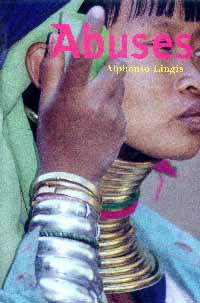 | Title: Abuses Author: Lingis, Alphonso 1933- Published: University of California Press, 1994 Subjects: Philosophy | Literature | Cultural Anthropology | Social and Political Thought | Psychology | Travel Publisher's Description: Part travelogue, part meditation, Abuses is a bold exploration of central themes in Continental philosophy by one of the most passionate and original thinkers in that tradition writing today.A gripping record of desires, obsessions, bodies, and spaces experienced in distant lands, Alphonso Lingis's book offers no less than a new approach to philosophy - aesthetic and sympathetic - which departs from the phenomenology of Levinas and Merleau-Ponty. "These were letters written to friends," Lingis writes, "from places I found myself for months at a time, about encounters that moved me and troubled me. . . . These writings also became no longer my letters. I found myself only trying to speak for others, others greeted only with passionate kisses of parting."Ranging from the elevated Inca citadel of Machu Picchu, to the living rooms of the Mexican elite, to the streets of Manila, Lingis recounts incidents of state-sponsored violence and the progressive incorporation of third-world peoples into the circuits of exchange of international capitalism. Recalling the work of such writers as Graham Greene, Kathy Acker, and Georges Bataille, Abuses contains impassioned accounts of silence, eros and identity, torture and war, the sublime, lust and joy, and human rituals surrounding carnival and death that occurred during his journeys to India, Bangladesh, Thailand, Bali, the Philippines, Antarctica, and Latin America. A deeply unsettling book by a philosopher of unusual imagination, Abuses will appeal to readers who, like its author, "may want the enigmas and want the discomfiture within oneself." [brief] Similar Items |
| 2. | 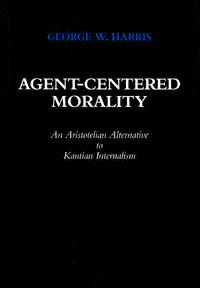 | Title: Agent-centered morality: an Aristotelian alternative to Kantian internalism Author: Harris, George W Published: University of California Press, 1999 Subjects: Philosophy Publisher's Description: What kinds of persons do we aspire to be, and how do our aspirations fit with our ideas of rationality? In Agent-Centered Morality , George Harris argues that most of us aspire to a certain sort of integrity: We wish to be respectful of and sympathetic to others, and to be loving parents, friends, and members of our communities. Against a prevailing Kantian consensus, Harris offers an Aristotelian view of the problems presented by practical reason, problems of integrating all our concerns into a coherent, meaningful life in a way that preserves our integrity. The task of solving these problems is "the integration test."Systematically addressing the work of major Kantian thinkers, Harris shows that even the most advanced contemporary versions of the Kantian view fail to integrate all of the values that correspond to what we call a moral life. By demonstrating how the meaning of life and practical reason are internally related, he constructs from Aristotle's thought a conceptual scheme that successfully integrates all the characteristics that make a life meaningful, without jeopardizing the place of any. Harris's elucidation of this approach is a major contribution to debates on human agency, practical reason, and morality. [brief] Similar Items |
| 3. | 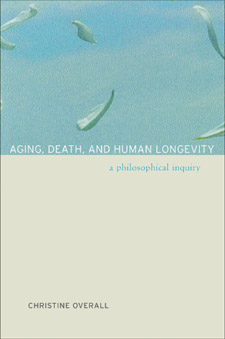 | Title: Aging, death, and human longevity: a philosophical inquiry Author: Overall, Christine 1949- Published: University of California Press, 2003 Subjects: Philosophy | Ethics | Public Policy Publisher's Description: With the help of medicine and technology we are living longer than ever before. As human life spans have increased, the moral and political issues surrounding longevity have become more complex. Should we desire to live as long as possible? What are the social ramifications of longer lives? How does a longer life span change the way we think about the value of our lives and about death and dying? Christine Overall offers a clear and intelligent discussion of the philosophical and cultural issues surrounding this difficult and often emotionally charged issue. Her book is unique in its comprehensive presentation and evaluation of the arguments - both ancient and contemporary - for and against prolonging life. It also proposes a progressive social policy for responding to dramatic increases in life expectancy. Writing from a feminist perspective, Overall highlights the ways that our biases about race, class, and gender have affected our views of elderly people and longevity, and her policy recommendations represent an effort to overcome these biases. She also covers the arguments surrounding the question of the "duty to die" and includes a provocative discussion of immortality. After judiciously weighing the benefits and the risks of prolonging human life, Overall persuasively concludes that the length of life does matter and that its duration can make a difference to the quality and value of our lives. Her book will be an essential guide as we consider our social responsibilities, the meaning of human life, and the prospects of living longer. [brief] Similar Items |
| 4. | 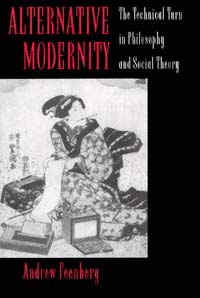 | Title: Alternative modernity: the technical turn in philosophy and social theory Author: Feenberg, Andrew Published: University of California Press, 1995 Subjects: Philosophy | Social and Political Thought | History and Philosophy of Science | Popular Culture Publisher's Description: In this new collection of essays, Andrew Feenberg argues that conflicts over the design and organization of the technical systems that structure our society shape deep choices for the future. A pioneer in the philosophy of technology, Feenberg demonstrates the continuing vitality of the critical theory of the Frankfurt School. He calls into question the anti-technological stance commonly associated with its theoretical legacy and argues that technology contains potentialities that could be developed as the basis for an alternative form of modern society.Feenberg's critical reflections on the ideas of Jürgen Habermas, Herbert Marcuse, Jean-François Lyotard, and Kitaro Nishida shed new light on the philosophical study of technology and modernity. He contests the prevalent conception of technology as an unstoppable force responsive only to its own internal dynamic and politicizes the discussion of its social and cultural construction.This argument is substantiated in a series of compelling and well-grounded case studies. Through his exploration of science fiction and film, AIDS research, the French experience with the "information superhighway," and the Japanese reception of Western values, he demonstrates how technology, when subjected to public pressure and debate, can incorporate ethical and aesthetic values. [brief] Similar Items |
| 5. | 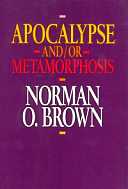 | Title: Apocalypse and/or metamorphosis Author: Brown, Norman Oliver 1913- Published: University of California Press, 1991 Subjects: Philosophy | Psychology | History Publisher's Description: Here is the final volume of Norman O. Brown's trilogy on civilization and its discontents, on humanity's long struggle to master its instincts and the perils that attend that denial of human nature. Following on his famous books Life Against Death and Love's Body , this collection of eleven essays brings Brown's thinking up to 1990 and the fall of Communism in Eastern Europe.Brown writes that "the prophetic tradition is an attempt to give direction to the social structure precipitated by the urban revolution; to resolve its inherent contradictions; to put an end to its injustice, inequality, anomie, the state of war . . . that has been its history from start to finish." Affiliating himself with prophets from Muhammad to Blake and Emerson, Brown offers further meditations on what's wrong with Western civilization and what we might do about it. Thus the duality in his title: crisis and the hope for change. In pieces both poetic and philosophical, Brown's attention ranges over Greek mythology, Islam, Spinoza, and Finnegan's Wake . The collection includes an autobiographical essay musing on Brown's own intellectual development. The final piece, "Dionysus in 1990," draws on Freud and the work of Georges Bataille to link the recent changes in the world's economies with mankind's primordial drive to accumulation, waste, and death. [brief] Similar Items |
| 6. | 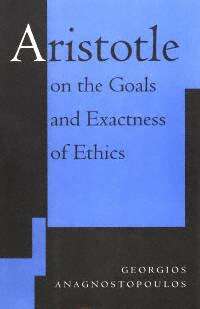 | Title: Aristotle on the goals and exactness of ethics Author: Anagnostopoulos, Georgios Published: University of California Press, 1994 Subjects: Philosophy | Classical Philosophy Publisher's Description: Philosophers as diverse as Socrates, Plato, Spinoza, and Rawls have sometimes argued that ethics can be an exact discipline whose propositions can match the exactness we associate with mathematics. Yet for Aristotle, knowledge of ethical matters is essentially inexact, and his perceptive criticisms of the Socratic-Platonic ideal of ethical knowledge and its metaphysical presuppositions remain of enduring interest to contemporary moral theorists.Georgios Anagnostopoulos offers the most systematic and comprehensive critical examination to date of Aristotle's views on the exactness of ethics. Combining rigorous philosophical argument and close analysis of the philosopher's treatises on human conduct, he gives form to Aristotle's belief that knowledge of matters of conduct, not unlike knowledge of most natural phenomena, can never be free of certain kinds of inexactness. He concludes that according to Aristotle, ethics constitutes a mode of knowledge that is neither totally nondemonstrative on account of its inexactness nor free of the important epistemological difficulties common to all nonmathematical disciplines. [brief] Similar Items |
| 7. | 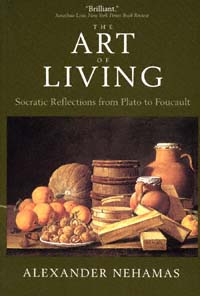 | Title: The art of living: Socratic reflections from Plato to Foucault Author: Nehamas, Alexander 1946- Published: University of California Press, 1998 Subjects: Classics | Classical Philosophy | Classical Literature and Language | Philosophy | Social and Political Thought | Literature Publisher's Description: For much of its history, philosophy was not merely a theoretical discipline but a way of life, an "art of living." This practical aspect of philosophy has been much less dominant in modernity than it was in ancient Greece and Rome, when philosophers of all stripes kept returning to Socrates as a model for living. The idea of philosophy as an art of living has survived in the works of such major modern authors as Montaigne, Nietzsche, and Foucault. Each of these writers has used philosophical discussion as a means of establishing what a person is and how a worthwhile life is to be lived. In this wide-ranging, brilliantly written account, Alexander Nehamas provides an incisive reevaluation of Socrates' place in the Western philosophical tradition and shows the importance of Socrates for Montaigne, Nietzsche, and Foucault.Why does each of these philosophers - each fundamentally concerned with his own originality - return to Socrates as a model? The answer lies in the irony that characterizes the Socrates we know from the Platonic dialogues. Socratic irony creates a mask that prevents a view of what lies behind. How Socrates led the life he did, what enabled or inspired him, is never made evident. No tenets are proposed. Socrates remains a silent and ambiguous character, forcing readers to come to their own conclusions about the art of life. This, Nehamas shows, is what allowed Montaigne, Nietzsche, and Foucault to return to Socrates as a model without thereby compelling them to imitate him.This highly readable, erudite study argues for the importance of the tradition within Western philosophy that is best described as "the art of living" and casts Montaigne, Nietzsche, and Foucault as the three major modern representatives of this tradition. Full of original ideas and challenging associations, this work will offer new ways of thinking about the philosophers Nehamas discusses and about the discipline of philosophy itself. [brief] Similar Items |
| 8. | 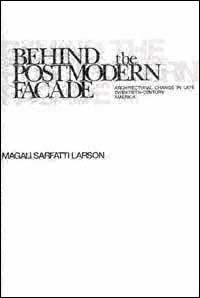 | Title: Behind the postmodern facade: architectural change in late twentieth-century America Author: Larson, Magali Sarfatti Published: University of California Press, 1993 Subjects: Architecture | Architecture | Philosophy | Politics | American Studies | Sociology | Social Theory Publisher's Description: Magali Larson's comprehensive study explores how architecture "happens" and what has become of the profession in the postmodern era. Drawing from extensive interviews with pivotal architects - from Philip Johnson, who was among the first to introduce European modernism to America, to Peter Eisenman, identified with a new "deconstructionist" style - she analyzes the complex tensions that exist between economic interest, professional status, and architectural product. She investigates the symbolic awards and recognition accorded by prestigious journals and panels, exposing the inner workings of a profession in a precarious social position. Larson captures the struggles around status, place, and power as architects seek to redefine their very purpose in contemporary America.The author's novel approach in synthesizing sociological research and theory proposes nothing less than a new cultural history of architecture. This is a ground-breaking contribution to the study of culture and the sociology of knowledge, as well as to architectural and urban history. [brief] Similar Items |
| 9. | 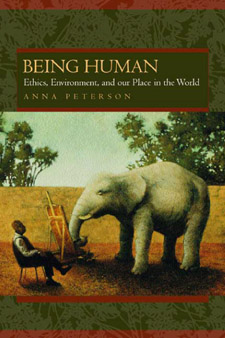 | Title: Being human: ethics, environment, and our place in the world Author: Peterson, Anna Lisa 1963- Published: University of California Press, 2001 Subjects: Religion | Folklore and Mythology | Environmental Studies | Philosophy Publisher's Description: Being Human examines the complex connections among conceptions of human nature, attitudes toward non-human nature, and ethics. Anna Peterson proposes an "ethical anthropology" that examines how ideas of nature and humanity are bound together in ways that shape the very foundations of cultures. Peterson discusses mainstream Western understandings of what it means to be human, as well as alternatives to these perspectives, and suggests that the construction of a compelling, coherent environmental ethics will revise our ideas not only about nature but also about what it means to be human. [brief] Similar Items |
| 10. | 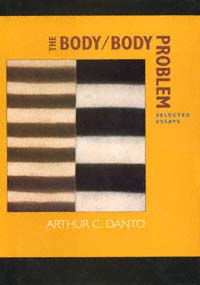 | Title: The body/body problem: selected essays Author: Danto, Arthur Coleman 1924- Published: University of California Press, 1999 Subjects: Philosophy | Art Criticism | Social and Political Thought Publisher's Description: The overall subject of the essays in The Body/Body Problem is the traditional one of what our ultimate makeup is, as creatures with minds and bodies. The central thesis is that we are beings who represent - and misrepresent - actual and possible worlds. Addressing philosophical questions of mental representation, Danto presents his distinctive approach to some of the most enduring topics in philosophy. He is concerned with the nature of description, the status of the external world, action theory, the philosophy of history, and the philosophical status of psychoanalytic explanation. Representation is a central concept in philosophy, says Danto, with differences among philosophers arising in the ways they account for how representations connect to the world or to the individuals possessing them, and how they connect with one another to form systems of beliefs, feelings, and attitudes. In these essays Danto's own voice, with his arguments and speculations, provides rich philosophical pleasures that will endure, to borrow from Santayana, "under whatever sky."Arthur C. Danto is one of the most original and multitalented philosophers writing today, a thinker whose interests traverse the boundaries of traditional understandings of philosophy. Best known for his contributions to the philosophy of art and aesthetics, Danto is also esteemed for his work in the history of philosophy, the philosophy of history, philosophical psychology, and action theory. These two volumes, each with an introduction by the author, contain essays spanning more than twenty-five years that have been selected to highlight the inseparability of philosophy and art in Danto's work. Together they present the thinking of Arthur C. Danto at his very best. [brief] Similar Items |
| 11. | 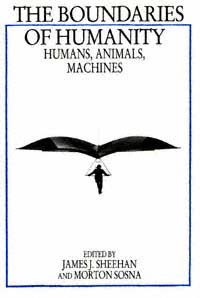 | Title: The Boundaries of humanity: humans, animals, machines Author: Sheehan, James J Published: University of California Press, 1991 Subjects: Philosophy | History and Philosophy of Science | Biology | Technology and Society Publisher's Description: To the age-old debate over what it means to be human, the relatively new fields of sociobiology and artificial intelligence bring new, if not necessarily compatible, insights. What have these two fields in common? Have they affected the way we define humanity? These and other timely questions are addressed with colorful individuality by the authors of The Boundaries of Humanity .Leading researchers in both sociobiology and artificial intelligence combine their reflections with those of philosophers, historians, and social scientists, while the editors explore the historical and contemporary contexts of the debate in their introductions. The implications of their individual arguments, and the often heated controversies generated by biological determinism or by mechanical models of mind, go to the heart of contemporary scientific, philosophical, and humanistic studies. [brief] Similar Items |
| 12. | 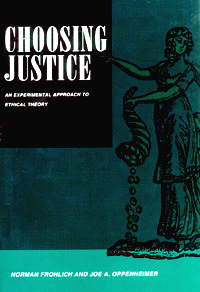 | Title: Choosing justice: an experimental approach to ethical theory Author: Frohlich, Norman Published: University of California Press, 1992 Subjects: Politics | Economics and Business | Philosophy | Political Theory | Social Theory | Ethics Similar Items |
| 13. | 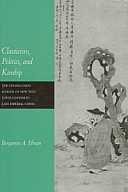 | Title: Classicism, politics, and kinship: the Chʿang-chou school of new text Confucianism in late imperial China Author: Elman, Benjamin A 1946- Published: University of California Press, 1990 Subjects: History | China | Philosophy Publisher's Description: Scholars have generally agreed that the story of New Text Confucianism in late imperial China centers on K'ang Yu-wei and the late nineteenth-century political reforms he took credit for after fleeing China in 1898. In this important new book, Benjamin Elman explores the roots of New Text ideas and shows that Confucians first dissented from the orthodox raison d'etre of the imperial state over three hundred years earlier, during the transition from the late Ming to early Ch'ing dynasties.New Text scholars, although not revolutionary, stood for new forms of belief, and they challenged the authenticity of classical sources upon which much orthodox political discourse had been based. Their notions of historical change proved to be important stepping stones toward an influential New Text vision of social and political transformation that climaxed in the 1898 reform movement.Elman examines the conflicting New Text versus Old Text portraits of Confucius in order to gain a more precise grasp of classical studies in imperial China as the ideological source for the "constitutionality" of the Confucian imperium. Central to his argument is the discovery that kinship organizations in pre-modern China played an important role in fostering schools of learning such as the Ch'ang-chou New Text school. Accordingly, this study affords us a unique perspective on how gentry sought to impose their agenda on the state in an effort to weather the great changes occurring during the Ming and Ch'ing dynasties. [brief] Similar Items |
| 14. | 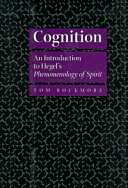 | Title: Cognition: an introduction to Hegel's Phenomenology of spirit Author: Rockmore, Tom 1942- Published: University of California Press, 1997 Subjects: Philosophy | Intellectual History Publisher's Description: Hegel's Phenomenology of Spirit , the philosopher's first and perhaps greatest work, is the most important philosophical treatise of the nineteenth century. In this companion volume to his general introduction to Hegel, Tom Rockmore offers a passage-by-passage guide to the Phenomenology for first-time readers of the book and others who are not Hegel specialists.Rockmore demonstrates that Hegel's concepts of spirit, consciousness, and reason can be treated as elements of a single, coherent theory of knowledge, one that remains strikingly relevant for the contemporary discussion. He shows how the various conceptions of cognition developed in the text culminate in absolute knowing, which Rockmore reads, in opposition to the frequent religious readings of Hegel, in a wholly secular manner. Unlike commentators who isolate Hegel's text from its philosophical origins, Rockmore analyzes the book in the philosophical context from which it emerged, lucidly discussing notoriously difficult passages in relation to the ideas of Aristotle and Descartes, and above all to those of Kant and other German idealists. [brief] Similar Items |
| 15. | 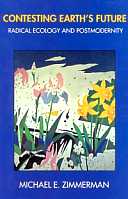 | Title: Contesting Earth's future: radical ecology and postmodernity Author: Zimmerman, Michael E 1946- Published: University of California Press, 1994 Subjects: Philosophy | Social and Political Thought | Natural History | Ecology | Sociology Publisher's Description: Radical ecology typically brings to mind media images of ecological activists standing before loggers' saws, staging anti-nuclear marches, and confronting polluters on the high seas. Yet for more than twenty years, the activities of organizations such as the Greens and Earth First! have been influenced by a diverse, less-publicized group of radical ecological philosophers. It is their work - the philosophical underpinnings of the radical ecological movement - that is the subject of Contesting Earth's Future .The book offers a much-needed, balanced appraisal of radical ecology's principles, goals, and limitations. Michael Zimmerman critically examines the movement's three major branches - deep ecology, social ecology, and ecofeminism. He also situates radical ecology within the complex cultural and political terrain of the late twentieth century, showing its relation to Martin Heidegger's anti-technological thought, 1960s counterculturalism, and contemporary theories of poststructuralism and postmodernity.An early and influential ecological thinker, Zimmerman is uniquely qualified to provide a broad overview of radical environmentalism and delineate its various schools of thought. He clearly describes their defining arguments and internecine disputes, among them the charge that deep ecology is an anti-modern, proto-fascist ideology. Reflecting both the movement's promise and its dangers, this book is essential reading for all those concerned with the worldwide ecological crisis. [brief] Similar Items |
| 16. | 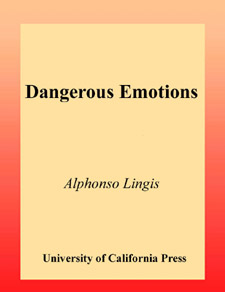 | Title: Dangerous emotions Author: Lingis, Alphonso 1933- Published: University of California Press, 2000 Subjects: Philosophy | Cultural Anthropology | Literature | Social and Political Thought | Travel Publisher's Description: Alphonso Lingis is an original among American philosophers. An eloquent and insightful commentator on continental philosophers, he is also a phenomenologist who has gone to live in many lands. Dangerous Emotions continues the line of inquiry begun in Abuses , taking the reader to Easter Island, Japan, Java, and Brazil as Lingis poses a new range of questions and brings his extraordinary descriptive skills to bear on innocence and the love of crime, the relationships of beauty with lust and of joy with violence and violation. He explores the religion of animals, the force in blessings and in curses. When the sphere of work and reason breaks down, and in catastrophic events we catch sight of cosmic time, our anxiety is mixed with exhilaration and ecstasy. More than acceptance of death, can philosophy understand joy in dying? Haunting and courageous, Lingis's writing has generated intense interest and debate among gender and cultural theorists as well as philosophers, and Dangerous Emotions is certain to introduce his work to an ever broader circle of readers. [brief] Similar Items |
| 17. | 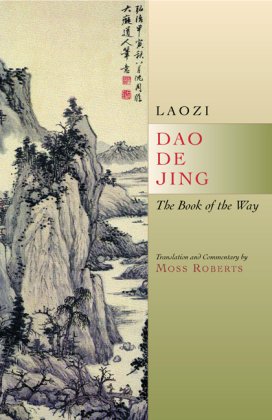 | Title: Dao de jing: the book of the way Author: Roberts, Moss 1937- Published: University of California Press, 2001 Subjects: Religion | China | Asian History | Asian Literature | Philosophy Publisher's Description: Dao De Jing is one of the richest, most suggestive, and most popular works of philosophy and literature. Composed in China between the late sixth and the late fourth centuries b.c., its enigmatic verses have inspired artists, philosophers, poets, religious thinkers, and general readers down to our own times. This new translation, both revelatory and authentic, captures much of the beauty and nuance of the original work. In an extensive and accessible commentary to his translation, Moss Roberts reveals new depths of Dao De Jing. This edition is distinguished by the literary quality of the translation, its new renderings for a number of the stanzas, and by Roberts's knowledgeable contextualizations. Utilizing recently discovered manuscripts and Chinese scholarship based on them, he is able to shed new light on the work's historical and philosophical contexts. This translation shows that Dao De Jing is far more than a work of personal inspiration; it is also a work of universal scope that makes penetrating comments on politics, statecraft, cosmology, aesthetics, and ethics. Roberts brings these themes to our attention, shows how they are integrated into the work as a whole, and demonstrates the relevance of these topics for our own times. [brief] Similar Items |
| 18. | 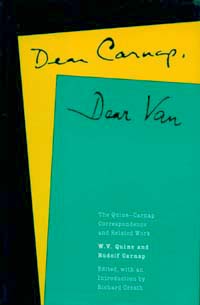 | Title: Dear Carnap, dear Van: the Quine-Carnap correspondence and related work Author: Carnap, Rudolf 1891-1970 Published: University of California Press, 1991 Subjects: Philosophy | History and Philosophy of Science | Autobiographies and Biographies Publisher's Description: Rudolf Carnap and W. V. Quine, two of the twentieth century's most important philosophers, corresponded at length - and over a long period of time - on matters personal, professional, and philosophical. Their friendship encompassed issues and disagreements that go to the heart of contemporary philosophic discussions. Carnap (1891-1970) was a founder and leader of the logical positivist school. The younger Quine (1908-) began as his staunch admirer but diverged from him increasingly over questions in the analysis of meaning and the justification of belief. That they remained close, relishing their differences through years of correspondence, shows their stature both as thinkers and as friends. The letters are presented here, in full, for the first time.The substantial introduction by Richard Creath offers a lively overview of Carnap's and Quine's careers and backgrounds, allowing the nonspecialist to see their writings in historical and intellectual perspective. Creath also provides a judicious analysis of the philosophical divide between them, showing how deep the issues cut into the discipline, and how to a large extent they remain unresolved. Dear Carnap, I enclose a copy of a paper which I am ready to send off for publication. . . . I am anxious to have you look this over as soon as possible, to see whether you have reason to suppose the system contradictory: for it looks dangerous. Dear Quine: I read your paper very carefully and with the highest interest. . . . So far, I do not see any contradiction in the system itself . . . but I share your feeling that the whole looks rather dangerous. [brief] Similar Items |
| 19. | 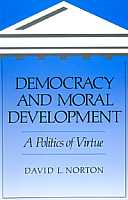 | Title: Democracy and moral development Author: Norton, David L Published: University of California Press, 1990 Subjects: Philosophy | Political Theory | Ethics Publisher's Description: At a time when politics and virtue seem less compatible than oil and water, Democracy and Moral Development shows how to bring the two together. Philosopher David Norton applies classical concepts of virtue to the premises of modern democracy. The centerpiece of the book is a model of organizational . . . [more] Similar Items |
| 20. |  | Title: Descartes's imagination: proportion, images, and the activity of thinking Author: Sepper, Dennis L Published: University of California Press, 1996 Subjects: Philosophy | History and Philosophy of Science Publisher's Description: Renè Descartes is commonly portrayed as a strict rationalist, a philosopher who theorized a radical, unresolvable split between mind and body. In this long-overdue examination of the role of imagination in Descartes's thought, Dennis Sepper reveals a Descartes quite different from the usual dualistic portrayals and offers a critical reconception of the genesis and nature of the philosopher's thought.In a vigorous analysis of the less-known early works, Sepper finds that initially Descartes assigned the imagination a central role in the mind's activity. Although Descartes eventually lost confidence in the philosophy of imagination, an early understanding of its central role in cognition came to shape the most fundamental notions of his mature philosophy. Sepper's radical reassessment of Descartes ultimately raises new questions about the development of modern philosophy. [brief] Similar Items |